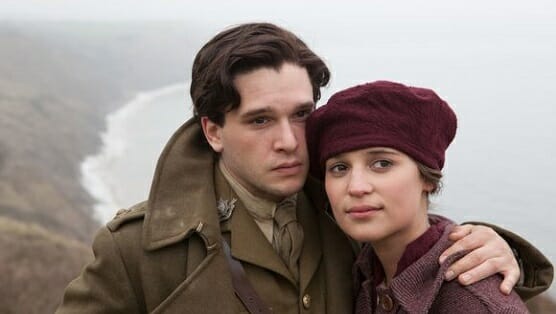
Some of the most notable films about World War I—All Quiet on the Western Front, Gallipoli, Sergeant York, Wings, among them—were naturally created from the soldier’s perspective. The latest to enter the foray of WW I cinema, Testament of Youth, takes a different viewpoint. Directed by documentarian James Kent in his feature debut, the film is based on a best-selling war memoir by writer and pacifist Vera Brittain.
The coming-of-age biopic follows Brittain, played by It-Girl Alicia Vikander (Ex Machina), as she grows from a determined, forward-thinking girl of English privilege to a budding feminist and political advocate. While the film is beautifully crafted, Kent and screenwriter Juliette Towhidi (Calendar Girls), who was tasked with paring down a 600-page memoir to a two-hour script, don’t quite go far enough in exploring the heroine’s post-war political work, which would have made Testament of Youth into a singular work in the war genre.
The film begins in the spring of 1914 with Vera, her brother Edward (Taron Egerton), and Edward’s military school friends Roland (Game of Thrones’ Kit Harington) and Victor (Colin Morgan) enjoying a leisurely break from school at the Brittains’ well-appointed home in the English countryside. From the opening scenes, Vera seems more a woman of the 21st century than Edwardian England. Not one to care about social mores, she fearlessly leads the boys in a swimming excursion and throws a temper tantrum in front of guests when her parents gift her with a piano. The instrument represents at least a term’s tuition at Oxford, and her parents (Dominic West and Emily Watson) refuse to let her sit for entrance exams under the pretense that they can only comfortably afford her brother’s tuition.
Under the encouragement of fellow writer Roland, and with Edward serving as an intermediary between their parents, Vera eventually takes the entrance exam, passes and is admitted to Oxford’s Somerville College. She eagerly anticipates Roland and Edward joining her at university, but the outbreak of war changes their plans as the idealistic young men enlist. Vera, feeling useless at school, gives up her writing and education to become a nurse, moving closer and closer to the front to try and make some difference in a seemingly futile war effort.
Although marketed as a wartime romance, viewers seeking an epic Farewell to Arms-type love story will be disappointed. Roland and Vera’s relationship is little more than puppy love that—because of the urgency of wartime—turns into a hastened courtship and engagement. The tragedies that befall Vera would seem impossible were they not true, and smartly Kent steers clear of the tempting melodrama. Instead, the film focuses on Vera’s—and to an extent, the other less-developed characters’—eventual disillusionment with the war. In the turning point in her life and film, she’s assigned to nurse injured German soldiers at the front. In the bloody Quonset hut, she realizes that the enemy is not so different from the soldiers on their own side. Testament of Youth is an understated war film, but its restraint both buoys and hampers the result: In its quest to remain true to Brittain’s life story, the film doesn’t resonate emotionally with viewers.
It’s no surprise that the camera loves a close-up on Vikander, who plays the stoic, determined Vera. Her expressive features are able to convey and hold complex emotions, but the character’s standoffishness holds the audience at bay. Vera seems to have no close friends of her own, only her brother and his friends. When the women of the college, especially Miranda Richardson (in much too small a role) as a tough classics professor, and some of the fellow nurses reach out to her, Vera keeps them all at a distance, which is puzzling for a budding feminist and supporter of women’s rights.
While Kent’s film adeptly examines themes of hope, futility and overcoming adversity, Testament of Youth struggles to find its real footing. It spends too much time on tragedies that are inherent to most war films and only begins to explore some of the most interesting parts of Vera’s life at the film’s end.
When she returns to school after the war, the beginning of a lifelong and important friendship with fellow student, writer, feminist and socialist Winifred Holtby (Alexandra Roach) is glossed over. So, too, is her marriage to political scientist George Caitlin and her burgeoning political work for the peace movement. An in-depth examination of that part of Vera’s life could have been a truer way to show the resilience of the human spirit and how one woman honored the memories of those she lost in war.
Director: James Kent
Writer: Juliette Towhidi, based on Vera Brittain’s memoir
Starring: Alicia Vikander, Kit Harington, Taron Egerton, Emily Watson, Hayley Atwell and Colin Morgan
Release Date: June 5, 2015
Christine N. Ziemba is a Los Angeles-based freelance pop culture writer and regular contributor to Paste. You can follow her on Twitter.